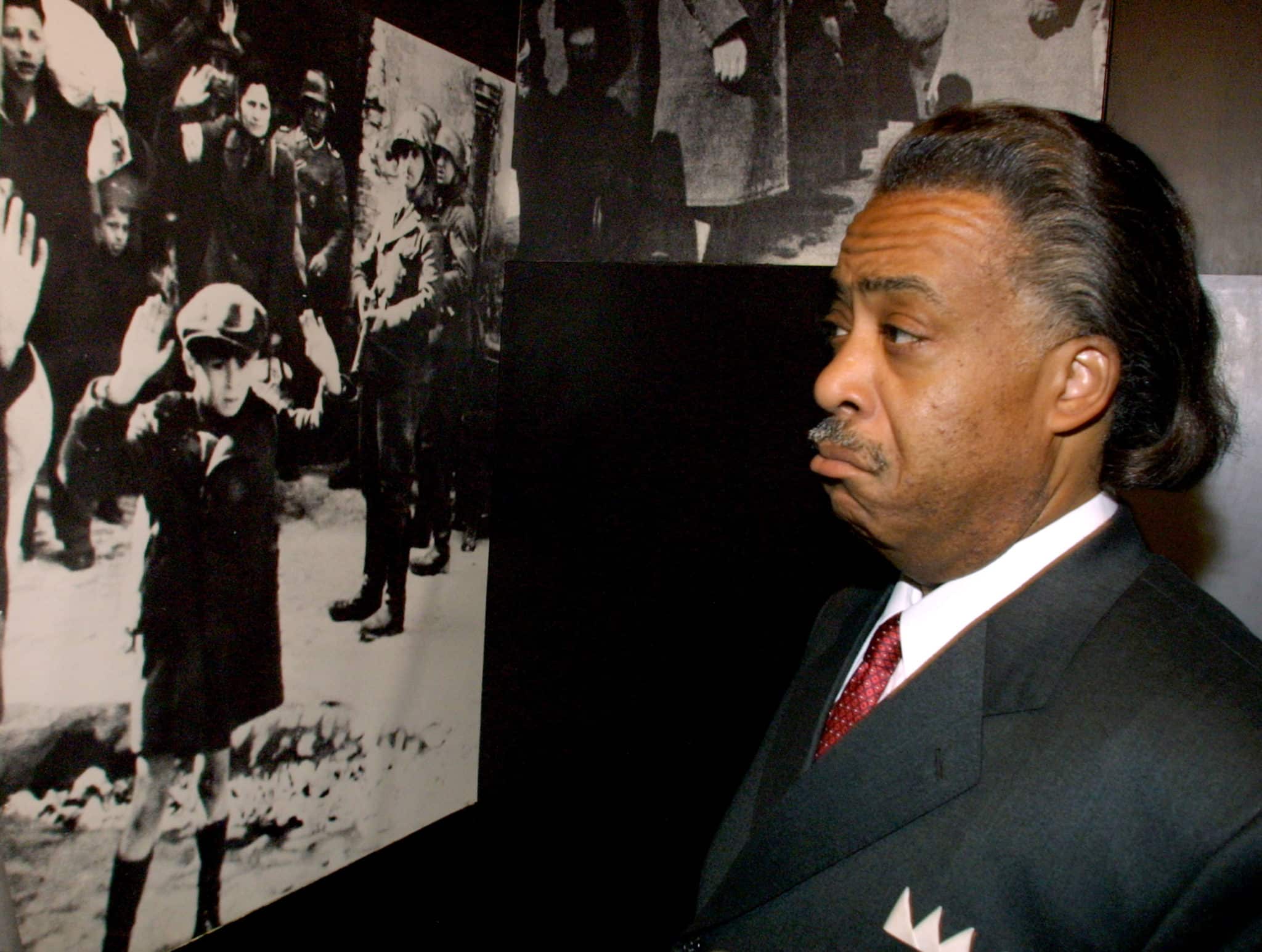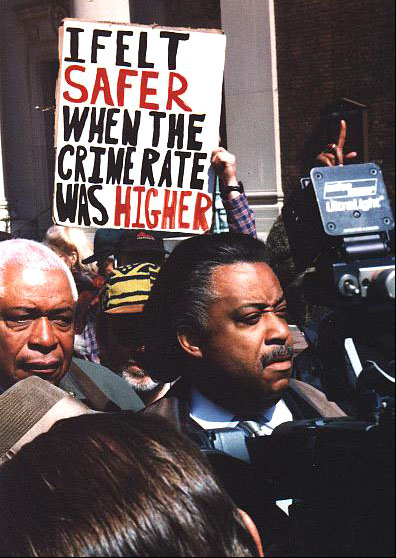 396609 0: Controversial activist Rev. Al Sharpton pauses at a famous photograph of a Jewish boy under Nazi guard on display at the Yad Vashem Holocaust Memorial museum October 30, 2001 in Jerusalem. Sharpton, who is visiting to Israel and the Palestinian Authority, declared that he is not anti-semitic and has always dealt “fairly and squarely” with the Jewish community in his home town of New York. (Photo by David Silverman/Getty Images)
396609 0: Controversial activist Rev. Al Sharpton pauses at a famous photograph of a Jewish boy under Nazi guard on display at the Yad Vashem Holocaust Memorial museum October 30, 2001 in Jerusalem. Sharpton, who is visiting to Israel and the Palestinian Authority, declared that he is not anti-semitic and has always dealt “fairly and squarely” with the Jewish community in his home town of New York. (Photo by David Silverman/Getty Images) (JNS) Is there any red line that the Anti-Defamation League won’t cross in order to pursue its current agenda that prioritizes partisan politics over combating anti-Semitism? In the five years since Jonathan Greenblatt succeeded longtime ADL leader Abe Foxman at the helm of the anti-Semitism monitor, the answer to that question has always been clear. But by openly allying itself with Al Sharpton—the man who helped incite the Crown Heights riots in the summer of 1991—the ADL has not just abandoned its core mission in favor of partisan politics, but has utterly disgraced itself in a manner that ought to shame its staff and donors.
Greenblatt, a veteran of the last two Democratic administrations, moved the group away from its nonpartisan stance into one in which it has become a faithful auxiliary of the Democratic Party. That has been made painfully obvious repeatedly as Greenblatt has taken openly partisan stances on issues like Supreme Court nominations and consistent attempts to link President Donald Trump to anti-Semitism. But while the group’s championing of the “Stop the Hate” campaign, which aims to pressure Facebook to begin censoring content, sounds like it is reverting to its job of bearing witness against anti-Semitism, that’s not true.
That has been made painfully obvious repeatedly as Greenblatt has taken openly partisan stances on issues like Supreme Court nominations and consistent attempts to link President Donald Trump to anti-Semitism.
The #stophateforprofit campaign claims that its goal is to mobilize the country to force Facebook to cease allowing its platform to be used to promote hate. That sounds laudable. It is represented by its principle advocates, such as Greenblatt and actor Sacha Baron Cohen, as merely a request that Facebook CEO Mark Zuckerberg stop serving as an enabler of neo-Nazis. And if it were that simple, who would oppose it?
In practice, that means setting up a system to censor political ads subjectively so as to treat those from conservatives as inherently hateful or untrue while giving a pass to the left. Under any circumstances, that would be questionable. But in the context of a presidential election being contested in an environment in which many, if not most, Americans get their news from their social-media feeds, pushing Facebook to censor or tag ads and posts in this manner is an outrageous form of political cheating.
As I’ve previously noted, the ability of Internet giants like Facebook, Twitter and Google to use their enormous power to control the information superhighway is a clear and present danger to democracy. While Trump’s critics treat his bluster and coarse language as evidence of incipient authoritarianism, it is the potential for social-media giants to tilt the scales for or against certain politicians and ideas that constitutes the real possibility of establishing authoritarian rule.

Google’s attempts to deny the use of its ad revenue to conservative websites are deeply problematic, as is the decision of Twitter to dabble in censorship. But Facebook, with its billions of users, is in a unique position to ensure that its platform, which is so successful because it is so ubiquitous, to mute or silence views its left-wing staff doesn’t like. While Democrats have mythologized the activities of Russian bots on Facebook into an excuse for Hillary Clinton’s defeat in 2016, the point of this campaign is to weaponize the same forum to aid former Vice President Joe Biden.
Though his motives have more to do with profit than principle, Zuckerberg has deserved some credit for resisting this pressure. But last week, it took the first step down the slippery slope towards censorship by agreeing to label posts from politicians that it deems an effort to “incite violence” or to “suppress voting.”
In a political environment in which liberal journalists are treating any call to enforce the rule of law against rioters as inciting violence, Facebook’s adoption of such vague language is ominous. The same is true with talk of voter suppression, which is the way some on the left define any attempt to ensure the integrity of elections.
But the interesting thing about ADL’s decision to partner with Sharpton is that it illustrates how such partisan goals have now superseded its task of monitoring Jew-hatred.
But the interesting thing about ADL’s decision to partner with Sharpton is that it illustrates how such partisan goals have now superseded its task of monitoring Jew-hatred.
Greenblatt’s predecessor Foxman was a child survivor of the Holocaust, and he took the job of granting absolution to those who were guilty of anti-Semitism in the past seriously. Those who would seek his blessing actually had to repent of their hate and behave in a manner that wouldn’t embarrass their sponsor.
Greenblatt, however, hasn’t required Sharpton to fully confess his role as a race-baiting inciter of anti-Semitic violence. Instead, he treats Sharpton as a valuable political ally whose support for ADL’s ventures is a gift for which he is truly grateful.
To be fair to Greenblatt, he’s not alone in this respect. Last year, the Union of Reform Judaism played the same game with Sharpton when its Religious Action Center granted its seal of approval to him. That was particularly painful for many in Crown Heights and the Chabad-Lubavitch movement, whose adherents were the victims of what can only be described as a modern-day pogrom that Sharpton helped start.
In that case, as with this one, both groups judged politics—in the form of an anti-Trump alliance—as having far greater importance than holding Sharpton accountable for his past.
To be a foe of Trump and an ally of the Black Lives Matter movement, which at this moment has become the most powerful force in American public life, is to grant a person a lifetime get-out-of-jail-free card. It is deeply ironic that this is happening at the same time that BLM advocates and the social-media outrage mobs that enforce adherence to the movement’s catechism are canceling people left and right—both ordinary citizens and celebrity hypocrites alike—for the sin of opposing any part of the group’s radical agenda.
Greenblatt has already so trashed ADL’s reputation in his pursuit of a liberal political agenda (and perhaps a post in the next Democratic administration) that it may be hard to gin up much outrage about his embrace of a figure as disreputable as Sharpton. But it is no less outrageous for being so predictable and servile.
Jonathan S. Tobin is editor in chief of JNS—Jewish News Syndicate. Follow him on Twitter at: @jonathans_tobin.























 More news and opinions than at a Shabbat dinner, right in your inbox.
More news and opinions than at a Shabbat dinner, right in your inbox.